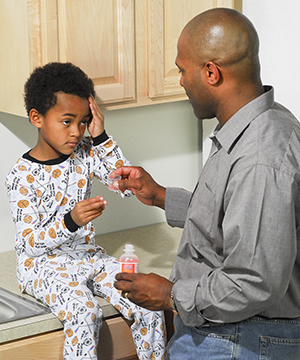When Your Child Has Tension Headaches
When Your Child Has Tension Headaches
It is not uncommon for children to get a type of headache called tension headaches. These headaches can be painful. But they are rarely a sign of a major health problem. Treatment can help your child feel better. Also, certain things can be done to help prevent tension headaches.
Understanding headache pain
The most common types of headaches are tension and migraine. Tension headaches are one of the most common types of headaches. Your child’s healthcare provider has told you that your child’s headaches are tension headaches. With a tension headache, pain can come from many areas of the head. These include the muscles, joints, eyes, blood vessels, or nerves. In some cases, your child feels referred pain (pain from another part of the body). For example, tense muscles in the shoulders or neck may lead to headache pain.
What causes tension headaches?
Tension headaches can have many causes. Common causes in children are:
Tension (physical or emotional)
Hunger
Trouble with eyesight
Eyestrain due to reading, video games, or computer use
Exposure to very strong smells (such as perfume or tobacco)
Fatigue (tiredness)
Sinus infection or allergies
Overheating
Dehydration (not enough fluid in the body)
What are the symptoms of tension headaches?
Every child is different. And your child’s headaches may feel different each time. Your child may have some or all of these symptoms:
Head pain that is focused in the front of the head
Neck pain along with head pain
Pain behind both eyes or in both temples
How are tension headaches diagnosed?
The healthcare provider will start by ruling out migraine headaches and headaches due to other causes. He or she will also examine your child and ask questions.
You will likely be asked about the times of day your child most often has headaches. You may also be asked about health issues, such as frequent sinus infections.
You and your child may be asked to keep a “headache diary” for a short period. This means writing down what time of day your child gets headaches, where the pain is felt, how often the headaches happen, and how bad the headaches are. You may also be asked to write down things that make the headache better or worse. The diary can help the healthcare provider learn more about the headaches and determine the best treatment.
How are tension headaches treated?
Treat your child at the first sign of a headache. The longer you wait, the longer the pain can take to go away. Give your child a dose of acetaminophen or an over-the-counter nonsteroidal anti-inflammatory drug (NSAID), such as ibuprofen. Do this as soon as possible. Your child may wish to lie down and rest until the headache is gone. A cold compress over the face and eyes may also be helpful.
How are tension headaches prevented?
To prevent headaches, avoid your child’s specific triggers. Triggers are things or events that cause headaches to occur. Some common triggers are hunger, eyestrain, strong odors, and fatigue. You and your child should learn his or her triggers and avoid them when possible. Be sure your child is eating well, getting enough sleep, getting daily physical activity, and limiting computer and TV time.
When should I call my healthcare provider?
Call your child’s healthcare provider right away if your child has any of the following:
Headache that doesn’t respond to over-the-counter medicine including acetaminophen or ibuprofen
Headache that seems different or much worse than previous headaches
Headache upon awakening or in the middle of the night
Vomiting due to headache (especially vomiting upon awakening)
Dizziness, clumsiness, slurred speech, or other changes with a headache
Blurred or double vision with headache
Unless advised otherwise by your child’s healthcare provider, call the provider right away if:
Your child is 3 months old or younger and has a fever of 100.4°F (38°C) or higher. Get medical care right away. Fever in a young baby can be a sign of a dangerous infection.
Your child is of any age and has repeated fevers above 104°F (40°C).
Your child is younger than 2 years of age and a fever of 100.4°F (38°C) continues for more than 1 day.
Your child is 2 years old or older and a fever of 100.4°F (38°C) continues for more than 3 days.
Your baby is fussy or cries and cannot be soothed.
Updated:
October 07, 2017
Reviewed By:
Adler, Liora, MD,Dozier, Tennille, RN, BSN, RDMS
